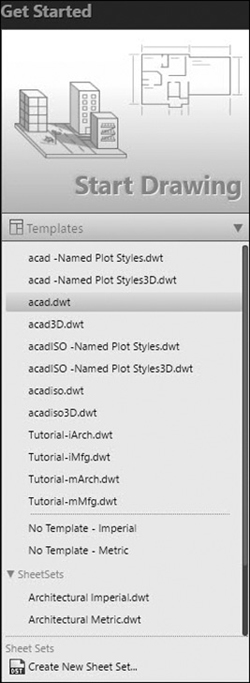Autocad Cant Open Templates Without Drawing Already in Them
This chapter is from the book
Creating a New Drawing
When you start a new drawing in AutoCAD, it places you in a blank drawing by default. This blank drawing is based on a number of default AutoCAD settings, which are stored in a drawing template . In addition to this default template, AutoCAD gives you other templates to choose from, which can save you time in setting up your drawing.
Using a Template
AutoCAD provides a number of predefined templates with default settings for various drawing disciplines. These drawing templates typically have title blocks in them and predefined settings for text, dimensioning, and plotting. You can also create your own templates or save any drawing as a template.
You can start a new drawing based on one of the predefined templates by selecting the Templates drop-down menu under Start Drawing on the left of the Start Tab to display the Templates list (see Figure 2-1).

FIGURE 2-1 The Templates list
Saving Your Work
When you create a new drawing using a template, it is initially named Drawing followed by an incremental number (Drawing1.dwg, Drawing2.dwg, Drawing3.dwg, etc.), indicating its place in the series when it was created. The drawing does not exist as a file on your computer or network until you save it at least once by selecting Save from the Quick Access toolbar, which runs the QSAVE command.
The QSAVE command is short for "Quick Save," although it is not so quick the first time you use it. The first time you use QSAVE, the standard Windows Save Drawing As file dialog box shown in Figure 2-2 is displayed so that you can give the drawing a file name and folder location to store the file on your computer or network. Subsequent use of the QSAVE command simply updates the file in its specified location, hence the "Quick" part.
Select the drive or device where you want to save the file by selecting it from the Save in: drop-down list at the top, and navigate to the desired folder using the Explorer-type interface in the middle. Enter the drawing name in the File name: list box or select a previous name from the drop-down list. Select the Save button to save the drawing in the specified folder and close the dialog box.
Now that the drawing is named, each time you use the QSAVE command from now on, by clicking on the Save icon on the Quick Access toolbar, AutoCAD will update the file in the specified location and overwrite the last saved version. You should save your drawing often using the QSAVE command to ensure that you don't lose too much work if an unexpected and/or catastrophic failure occurs. A good rule of thumb is to save your drawing every 10 to 15 minutes. Get in the habit of choosing Save from the Quick Access toolbar or by using the <Ctrl>+S keyboard combination.
File Safety Precautions
After you save a drawing once, every time you use the QSAVE command thereafter, a backup of the previous saved version of the drawing is saved in the same location with the same name as the drawing, except with a .BAK file extension. This feature allows you to recover drawing information up until the last time you saved it if for some reason this is necessary. In order to open the backup file you must either rename the .BAK extension to .DWG or use the Drawing Recovery Manager.
As double insurance, AutoCAD automatically saves your drawing at preset intervals to the Windows Temporary folder using a file name that consists of the drawing name followed by six numbers generated by AutoCAD and the file extension .SV$. The default interval between saves is 10 minutes. In order to restore an automatically saved file with the .SV$ extension, you must either rename the extension to .DWG or use the Drawing Recovery Manager.
Both the backup copy and automatic save options can be changed via the File Safety Precaution settings found on the bottom left of the Open and Save tab of the Options dialog box introduced on page 22 in Chapter 1. It is recommended that you leave both features on. Someday you will be glad you did!
Source: https://www.peachpit.com/articles/article.aspx?p=2982117&seqNum=2
0 Response to "Autocad Cant Open Templates Without Drawing Already in Them"
Enviar um comentário